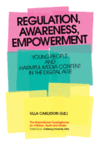Publications by English title: letter R
Regulation, awareness, empowerment: young people and harmful media content in the digital age; UNESCO-sponsored programmes and publications
In 2005 UNESCO asked the International Clearinghouse on Children, Youth and Media to prepare a publication on “Efforts and Innovative Approaches to Reduce Violence in Electronic and Digital Media”. The present volume presents the results of the work the Clearinghouse has done in response to that request.
Renewing the knowledge societies vision for peace and sustainable development
If the goal of knowledge societies is to foster peace and sustainability, it is imperative that strategies for action ensure that decisions at all levels promote the integration of knowledge within people’s lives in ways to maximize the benefits and minimize harms. This is the spirit guiding this Report, which draws on multiple case studies, highlights lessons since the first World Summit on the Information Society (WSIS) meeting in 2003, and sets out ideas for renewing UNESCO’s vision of knowledge societies.
Resource optimization
This module focuses on resource optimization and discusses how the open access environment can be promoted and how the collection development may be facilitated by integrating open access resources with institutional and library resources. At the end of this module, the learner is expected to be able to foster an enabling environment for Open Access, and facilitate collection development by integrating library services. The module consists of three units focusing, respectively, on OA mandates and policies, OA content management, and harvesting and integration.
Reports prepared for UNESCO on the occasion of the International Association of Media and Communication Research (IAMCR) 50th Anniversary Conference 2007
In July 2007, UNESCO and the International Association for Media and Communication Research (IAMCR) co-organized IAMCR’s 50th Anniversary Conference at UNESCO Headquarters in Paris, France. The Conference theme was “Media, Communication, Information: Celebrating 50 Years of Theories and Practices”. The four reports in this publication were commissioned by UNESCO as part of its generous support for the IAMCR conference.
Research: ICT innovations for poverty reduction
Research evaluation metrics
At present, research is going on all over the world practically in all subjects and generating millions of research articles. In some cases, the research works are generating very good results, in most cases mediocre, and in some cases negative results. Therefore, evaluation of research outputs becomes sine qua non. This module dwells on a number of methods (including old and new) available for research evaluation. Various tools and techniques are discussed in details to help researchers in strengthening their efforts in enhancing scientific productivity, visibility, reputation, and impact of their research works.
Risks associated with the use of recordable CDs and DVDs as reliable storage media in archival collections: strategies and alternatives
The purpose of this document, prepared by the Memory of the World Programme's Sub-Committee on Technology, is to provide detailed guidance on managing the risks associated with storing archival data on recordable CD and DVD. It recommends a strategy to reduce these risks through error measurement and appropriate management.
Road map: Improving journalistic coverage of elections in Jordan. Identifying challenges and proposing solutions
Free and fair elections are the cornerstone of any open and democratic society. Legitimate elections are impossible without a media that has access to information and the ability to report on candidates and their platforms accurately and impartially, giving the public the information it needs to make its choice. It is thus of paramount importance that rules and processes governing media during elections are transparent, fair, and in line with international standards for freedom of expression.







